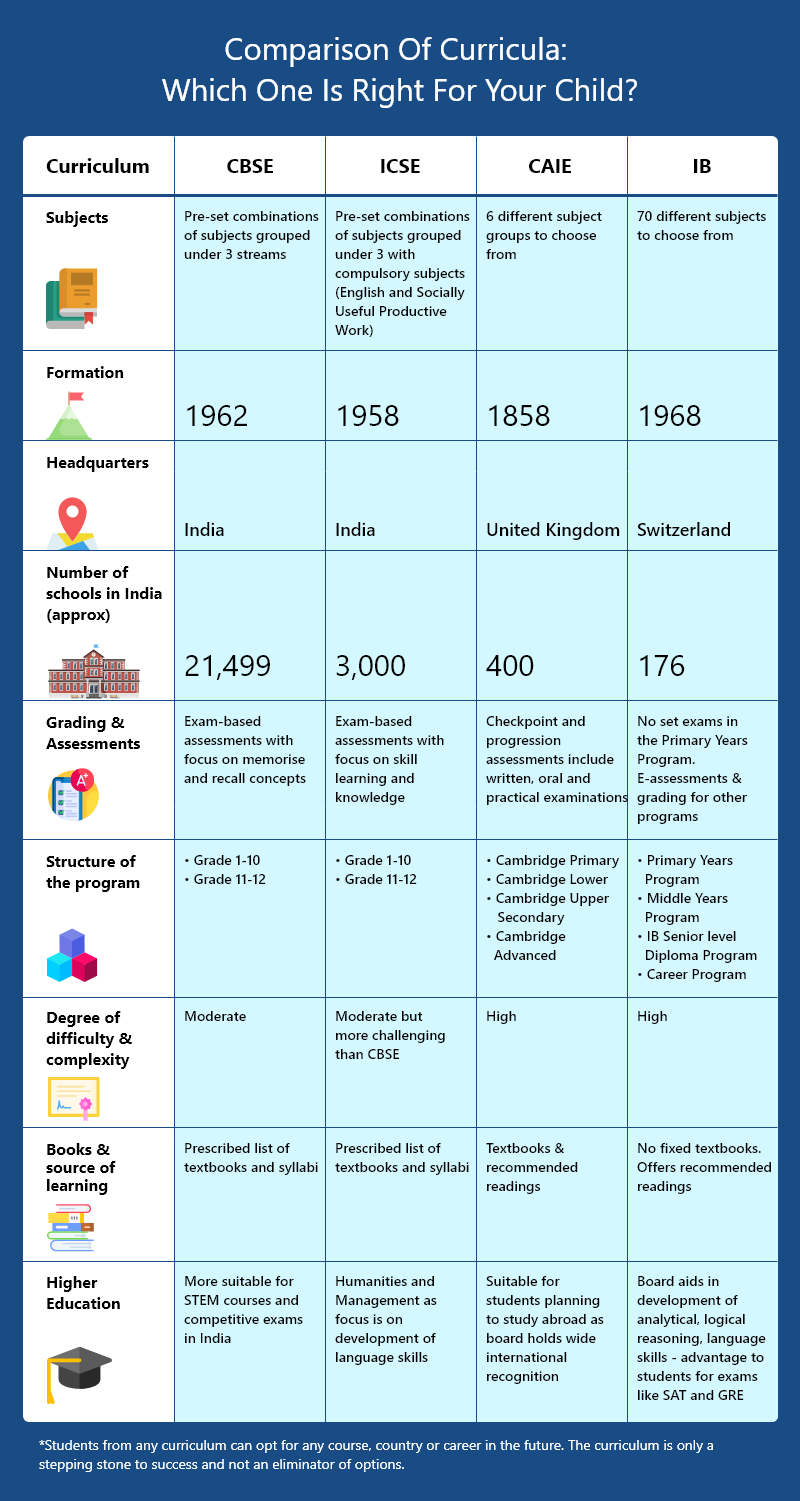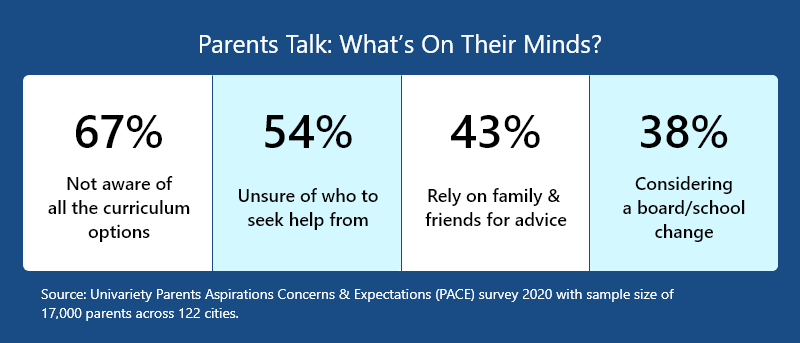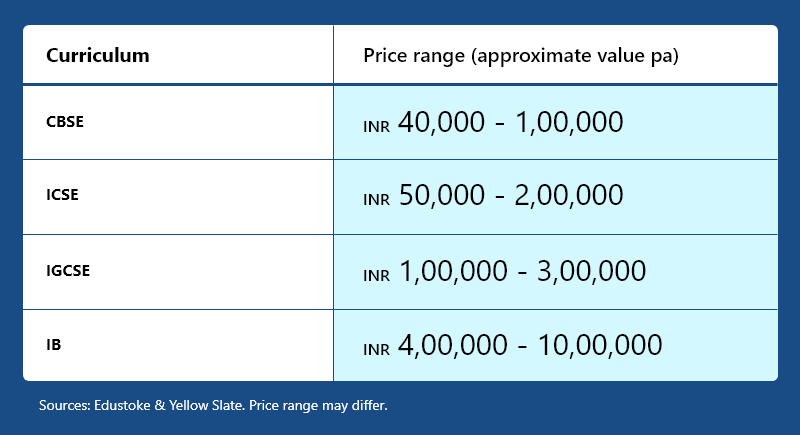Did you know that 38% of Indian parents are considering
|
One of the main reasons for the change is that the chosen curriculum is not inclined towards the goals of the child. This is a common concern most parents have – “How do I know what’s the right curriculum for my child?”
We’re here to answer that for you! Let’s start with: What comes to mind when we say Curriculum?
Often, we associate this term with only a few aspects of it like syllabus or school. But, curriculum is all of that and more! Your child’s future depends on the journey she will experience in the school that will shape her life – which is what curriculum offers.
Imagine you choose a board that doesn’t align with you and your child’s dreams!
You don’t want that – you want a smooth transition from school to University and career with the best quality life for your child.
Are you wondering why curriculum plays a big role in this conversation? Because it tells you what a school wants for its students and how they are going to achieve it. It is a series of activities and learning outcomes outlining where your child needs to go and how to get there.
Now the right question to ask is, “How do you know what’s the right board for your child?”
There are many factors that need to be considered to make that decision. Most times, these factors in a student’s education are missed or left to chance. But in reality, it is you, as a parent, who should analyse top factors that make a huge difference in your child’s future.
Let’s guide you through a set of 8 factors that will help you understand how to choose the right curriculum for your child.
https://www.youtube.com/watch?v=bAa486O2aG8
International Curriculum: The new trend
A decade ago, CBSE (Central Board of Secondary Education), State Boards and ICSE (Indian Certificate of Secondary Education) were the most talked-about curriculum options in India. In the last few years, international boards have become the buzzword for education among Indian parents.
| Did you know that India stands second in the world in the total number of International Schools? Source: Int’l schools double, India at second spot, Times of India |
From 313 international curriculum schools in India in 2013, the number has increased to 708 in 2019. These schools predominantly offer Cambridge curriculum and International Baccalaureate (IB), while a few offer Edexcel Examination Board as well.
In the last decade, the number of students passing out of the international curriculum in India has grown to 4 lakh from 1 lakh in 2010!
While it’s clear that parents are increasingly opting for international boards, these choices are rarely backed by expert guidance and detailed study of the curriculum. Parents don’t consider major points like their child’s ambitions and what different boards offer.
Also Read: Expert Guide to International Baccalaureate (IB) Curriculum [Everything You Need To Know]
According to the Univariety PACE survey 2020, 67% of parents are not aware of the curriculum options available
for their children.
In the largest survey of its kind, conducted with a sample size of 17,000 parents across 122 cities, 54% of them felt unsure of where to get help from. More than 40% said they rely on friends for advice.
Advice from friends is based on their own concerns & expectations and will differ from yours.
Hence, two big issues surface…
- Are you asking the right questions?
- Are you getting the answers that fit into your family priorities?
Framing Your Expectations
Deciding what curriculum is right for your child depends on what plans you and your child have for the future. Do you want the focus to be on academics or do you want your child to be able to have flexibility in subject choice and focus on overall development?
Here are 8 considerations that parents must think of while choosing a curriculum for their child:
1. Academic Focus
It wouldn’t be too much to say that most Indian parents give the academic performance a lot of importance over other factors in their child’s education.
But, in the last few years, the focus is shifting to a holistic approach in education. Even State Boards and CBSE are adapting to newer ways that help students get more than bookish knowledge.
Top CEOs and world leaders no more believe that old-school education is all that a child needs. The focus is shifting to the real-life skills needed in the future.
CBSE has a strong focus on academic scores when compared to IB and CAIE. With the Academic, Training, Innovation and Research unit, the board highlights the importance of academic excellence and ensures balanced academic activities in the schools. State Boards also work similarly, while IB doesn’t even set examinations or moderate grades for students in the primary levels. CAIE has optional assessments decided by each school for primary years.
2. Subject Flexibility
Understanding the subjects of your child’s choice is a major step in her path to success. As a parent, what expectations do you have from your child’s future?
The CBSE presents students with pre-set combinations of subjects for their primary and secondary school. While ICSE follows a similar pattern of streams, it adds more volume and intensity with additional subjects.
IB offers in-depth knowledge with a choice of six different subject groups, along with three compulsory subjects: Creativity Action Service (CAS), Extended Essay (EE) and Theory Of Knowledge (TOK). Cambridge offers a choice amongst 70 different subject options.
3. Overall Personality Development
A child’s mind is vulnerable and easily influenced during the early years. At this age, your child will look for guidance and self-affirmation from others – teachers and authorities in the school. The environment they’re in will aid in the development of their personality.
Compared to CBSE and State Boards, International curricula like IB and Cambridge focus on the personality of the students. The question here is how much importance do you give to personality development-related activities for your child?
4. Social Skills
Schooling has as much to do with the socialisation of children as it does with academic content. It is in schools that your child will learn to interact and communicate effectively with peers and authority figures.
International boards provide students with a holistic approach to education and development of both disciplinary and interdisciplinary understanding. For instance, the structure of CAIE and IB arm students with the requisite skillsets for the future like empathy, cultural awareness and higher-order thinking.
READ: How different social skills across different growing years of your child influences their lives?
5. Value System
According to the former President of India, APJ Abdul Kalam, the education system has the responsibility to transform a child into a leader with the right values.
What kind of a value system do you want your child to be a part of? Most times, parents think knowledge and syllabus also inculcate values in their children. But that’s a myth! While many syllabi try to highlight values, it is largely based on subject learning, which doesn’t focus solely on fostering values.
Although each school can customise the curriculum, international curricula like IB and CAIE focus on giving your child a global perspective with communication and professional skill-developing activities. On the other hand, CBSE and State Boards are more about academics. The value system inculcated by CBSE and ICSE is rooted in Indian culture and history.
6. Higher Education
According to the comprehensive PACE survey conducted by Univariety, only 11% of parents were confident that they and their children were well-prepared in terms of their college dreams.
What many parents don’t realise is that the base for your child’s higher education begins with the curriculum they’re a part of. What expectation do you have from your child’s future after school plays an important role in choosing the curriculum?
In the conversation about curriculum, here are a few factors that need to be considered:
- Entrance Test preparation: While the CBSE curriculum offers preparation for STEM courses and competitive exams like IIT and NEET, the international curriculum focuses on the overall development of students.
- College admissions: According to an article by the New York Times, grades plus strength of the high school curriculum carry a lot of weight in admissions in top global universities.
- Study abroad: In a pursuit to prepare students for global challenges, IB & CAIE give your child the exposure she needs for higher studies abroad. However, choosing one curriculum doesn’t stop your child from making any of their dreams come true.
The right board is only a stepping stone in the path to success and not an eliminator.
Univariety’s network of students and parents across India shows that out of 50,000 students from CBSE or ICSE, about 6% have opted to study in Universities abroad. On the other hand, out of 3,000 students from the international curriculum, about 50% have chosen to study outside of India. Collectively, more students join foreign universities from the CBSE & ICSE curricula in comparison to IB or Cambridge curricula.
Also Read: Your Guide To Cambridge Curriculum: Is It The Right Board For Your Child?
7. Parental Involvement
Did you know that one of the most undervalued factors in choosing the right curriculum is parental involvement?
Each board requires a different level of participation from the parent at various stages of their child’s educational journey. For instance, the IB board emphasises on the importance of parents being a part of the student’s journey. Your participation can be in different ways – helping your child in research, looking for summer internships, and more.
Frequently, we find well-to-do parents enroll their child in an international curriculum but are later unable to dedicate time. To what extent are you ready to be involved in your child’s classwork, extracurricular activities & other skill development activities? Ask yourself!
8. Willingness to Spend
Cost attributes of a curriculum are undoubtedly one of the most commonly considered factors. But are you, as a parent, considering the right factor?
The question you need to ask is not how much you CAN spend but how much you WANT to spend – the thin line between ability and willingness.
A common mistake made by many parents is to choose an international curriculum because their budget is higher. If you feel that the Indian curriculum options that you studied are the right choice, then you should opt for CBSE. If your willingness to spend is high, you could look for an international school with all facilities offering the CBSE curriculum.
Time for decision-making
You now have the questions ready. You’re aware of the factors you need to consider. Looking for solutions? Curriculum Selector is the answer to your questions!
Curriculum Selector is the world’s first curriculum evaluation program for parents that offers a scientifically researched roadmap to choosing the right curriculum for your child. It has been developed by Univariety with inputs from top CBSE educators, International Baccalaureate Organisation, Cambridge International, and University Faculty, among others.
You will go through the following key steps that will help you make the big decision:
1. Deep Fitment Analysis
The first step towards selecting the curriculum is defining your expectations and dreams in a structured manner. What out of the 8 learning expectations do you prioritise?
A questionnaire, designed around scenarios based on the 8 different factors, will help you collect your thoughts and reconsider decisions.
2. Expert Modules
Taking you closer to your decision, the Curriculum Selector goes a step forward in giving you expert advice through sessions by educators and professionals from the IB Board, Cambridge Board and heads of top schools.
Here’s a sample video from our product module for you!
3. Best-Fit Curriculum Recommendations & Detailed Report
From understanding your expectations as a parent to mapping them with the attributes each curriculum offers – the Best-Fit Curriculum Recommendations & Detailed Report will help you choose the right option.
Click here to download a Sample Report
4. Personalised Counselling Session
A one-on-one review of your expectations and the report with an expert counsellor will help you get an interpretation of your analysis.
Conclusion
As we discussed earlier, the importance of understanding what plans you and your child have for her future plays a big role in determining the right curriculum. From subject flexibility and value system to higher education plans and willingness to spend – we’ve listed a range of important factors that you must consider while choosing a curriculum.
Remember, it’s your expectations and plans for your child. Don’t depend on suggestions from friends and family because their dreams and wants are different.
Now that you have the lowdown of everything you need to know before choosing a curriculum for your child, it’s time to sit back and start thinking. It’s all about introspection and decision-making, and we are here to assist you!
So, how would you rank these 8 factors according to your child’s priority? Tell us in the comments below!
When Harini Prasad is not busy researching about top trends in education and learning techniques for students, you will find her writing about all things fashion, travel, cinema, and music. A millennial poster-child, Harini is a former lifestyle journalist with specialisation in child rights, gender, and new media journalism. Currently, she is busy exploring the world of marketing and content creation.


![How to Choose the Right Curriculum for Your Child? [8 Factors to Consider] How to Choose the Right Curriculum for Your Child?](https://www.univariety.com/blog/wp-content/uploads/2020/06/Comparison-Of-Curricula-banner.png)



1 Comment
Hi Madam,
It’s really nice work.congratulations.